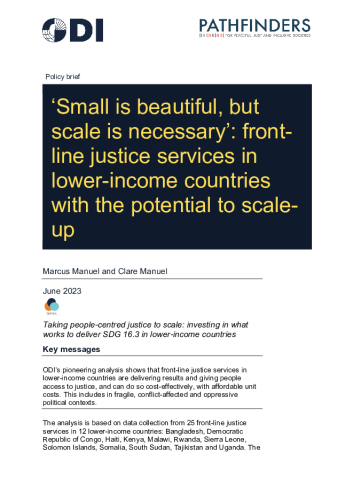This is the fifth in a series of papers on ‘Taking people-centred justice to scale: investing in what works to deliver SDG 16.3 in lower-income countries’ produced by ODI and the Pathfinders (NYU CIC). The research project focuses on practical, cost-effective and realistic ways to deliver sustainable justice services at scale and offers lessons both for lower-income countries and donor programming. The project runs until September 2023.
Key Messages
- ODI’s pioneering analysis shows that front-line justice services – those that provide criminal justice defenders for pre-trail detainees; and universal access to community-based legal advice and assistance – in lower-income countries are delivering results and giving people access to justice. This includes in fragile, conflict-affected and oppressive political contexts.
- The analysis looks at front-line justice services in 12 lower-income countries: Bangladesh, Democratic Republic of Congo, Haiti, Kenya, Malawi, Rwanda, Sierra Leone, Solomon Islands, Somalia, South Sudan, Tajikistan and Uganda. The services address a range of justice problems and legal needs, including gender-based violence; land disputes; community disputes; and human rights abuses.
- The costs per case achieved by front-line justice service providers validate benchmarks suggested by ODI: $20 per case in low-income countries and $50 per case in lower middle-income countries. With these benchmark unit costs, services have the potential to be scaled up. ODI’s analysis reveals for the first time how much scaling-up is required: coverage in most counties researched is under 5%.
- When front-line services scale-up to meet more legal needs, unit costs go down, creating a ‘virtuous circle’. ‘Frugal innovations’ such as reducing the role of lawyers for basic and community-level services, using appropriate technology and low-cost transport, as well as early intervention to prevent justice problems escalating, all contribute to affordable unit costs.
- The total cost of universal access to key elements of front-line justice is estimated at under $249 million a year across all low-income countries. This is 8% of current total aid to justice. Further research is needed on unit costs for front-line justice services, on the level of need, and on the benefits/impacts of investing in them.
